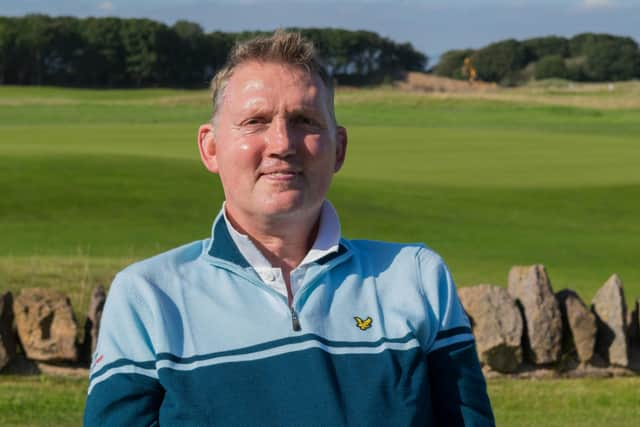Doddie Weir death: Rugby legend’s legacy is work to find MND cure
Weir, who won 61 caps and helped his country win the 1999 Five nations championship, has been described as “magical”, “inspiring” and “larger than life” after a tireless campaign to help find treatments and a cure for motor neurone disease (MND), raising millions since being diagnosed in 2016.
The My Name’5 Doddie Foundation has already donated more than £8 million of funding for research as well as providing support for others battling the condition.
Advertisement
Hide AdAdvertisement
Hide AdHis death sparked an outpouring of tributes, including from the Prince and Princess of Wales, the Prime Minister and First Minister.
Scott Hastings who played with Weir for Scotland, said his legacy will “without any shadow of a doubt” be the strides he took against the condition that took his life.
Hastings said: “He was a magical human being, simple as that.
“He was like a magnet, he attracted people to him, people kind of followed him.
“He was extraordinary both on and off the rugby pitch.


“Obviously latterly his work within the MND community means he leaves a legacy which is just unrivalled in many respects.”
In a tweet signed personally by William and Kate, Weir was described as a “hero”, with the royals adding: “We are so sad to hear of his passing. His immense talent on the pitch as well as his tireless efforts to raise awareness of MND were an inspiration.
“Our thoughts are with all those who loved him. He will be hugely missed across the entire rugby world.”
The Princess Royal, who is patron of MND Scotland, said: “He was truly larger than life, determined, generous and humble. He transformed people’s understanding of MND and funding for research.”


Advertisement
Hide AdAdvertisement
Hide AdFirst Minister Nicola Sturgeon led the tributes from Scotland’s political sphere, describing Weir as “one of our nation’s sporting legends”, but adding “The brave way he responded to MND surpassed anything ever achieved on the rugby pitch.”
Following diagnosis, Weir said his attitude was that “you should do what you can today and worry about tomorrow when it comes”. He said: “This is the hand I’ve been dealt so I’ve just got to crack on.”
Only a fortnight ago, Weir – wheelchair-bound and visibly frail – was greeted with a standing ovation from crowds when he turned out with his family to watch Scotland take on the New Zealand All Blacks in the autumn tests.
Friends and colleagues at his foundation have said they are “deeply saddened” at his loss, describing him as a force of nature, great family man and tremendous rugby player who was “loved and respected by all who knew him”.
Jill Douglas, chief executive of My Name’5 Doddie Foundation and a close friend of the rugby legend, said: “Doddie enjoyed a full life full of fun and love. And it was this approach to life which shone through in his determination to make a difference and help others when he was diagnosed with motor neuron disease.
“He inspired us every day with his positivity and energy and was fully committed to the work of the foundation he launched with his close friends in November 2017. My Name’5 Doddie Foundation continues to shine a light on MND and the need to seek meaningful treatments and, one day, a cure for this devastating disease.”
Rachel Maitland, chief executive of MND Scotland, said: “Doddie Weir was a huge inspiration who will be missed by so many. His bravery in sharing his experience of living with MND helped raise vital awareness across the country and beyond.”
She added: “MND does not wait for anyone and now we have another person taken too soon because of this cruel disease. We cannot thank Doddie enough for his support and contribution to improving the lives of those living with MND, and for all he did for the cause.”
Advertisement
Hide AdAdvertisement
Hide AdThe 6ft 6in forward was a true giant both on and off the field, memorably described by the late BBC commentator Bill McLaren as being “on the charge like a mad giraffe”.
Yesterday, the upcoming generation of Scottish rugby talent paid tribute at Weir’s former club in Melrose, where young players and coaches gathered to pay their respects and remember his achievements.
Meanwhile, fellow MND sufferer and campaigner Rob Burrow paid tribute to an inspirational “warrior”.
Like Weir, Burrow has also raised awareness of MND through considerable charity work. Earlier this month, Weir met with former Rhinos player Kevin Sinfield at the start of his ‘Ultra 7 in 7’ challenge, when he ran seven ‘ultra marathons’ in as many days for MND-related causes.
Burrow said: “I’m absolutely gutted to see my friendly giraffe die. You are the reason for being so positive RIP.”
Sinfield also paid tribute: “Doddie was a giant as a player, but his campaigning following his MND diagnosis made him a colossus,” the former Rhinos captain said.
“I am honoured to have been able to call Doddie my friend and I know his spirit lives on in all of us who knew him. He will always be a champion.”
MND, which stops signals from the brain reaching the muscles, is rapidly progressing and terminal. It causes muscle weakness and wasting and can rob sufferers of the ability to walk, talk, swallow and breathe unaided.
Advertisement
Hide AdAdvertisement
Hide AdThe average life expectancy of someone with MND is just 18 months from diagnosis, and there is currently no cure or effective treatments.
Ms Douglas added: “Our vision of a world free of MND remains at the heart of our strategy. As we look to the future, we will honour Doddie’s name and deliver on his legacy. There is much still to do and with your support we will continue our work, remaining true to the values and ambition of our founder.”
Comments
Want to join the conversation? Please or to comment on this article.